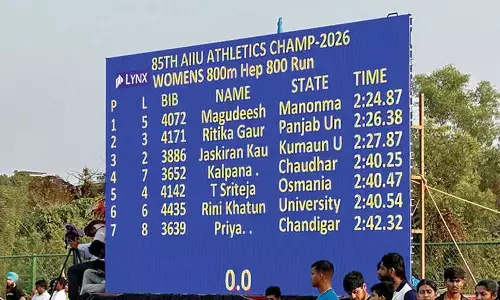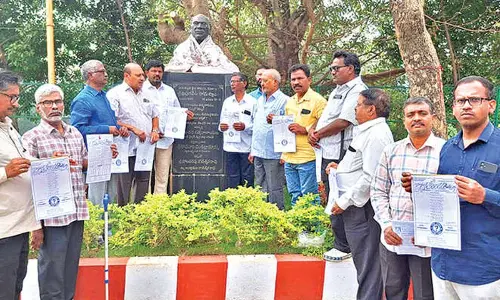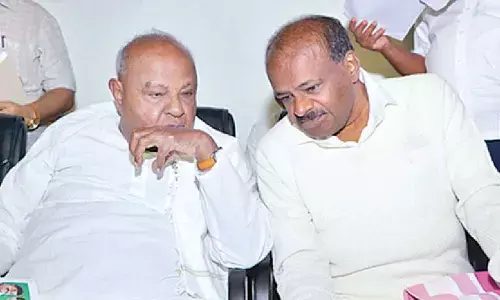'My work may be more useful to people than govts'

Dr Vamsi Vakulabharanam, Associate Professor of Economics in the University of Hyderabad, has just won the first ever Dr Amartya Sen Award for Social Sciences. He is presently in Japan and the following is an e-mail interview with him What is the area you are working on and what is its significance?  Currently I am working on two things. First is to analyse the relationship between economic development and inequality from a Marxian framework. Simon Kuznets (Nobel winner in economics) had argued in 1955 that when countries grow, inequality rises in the initial period, and then it begins to decline. Subsequently many economists have argued that the real world has not behaved according to this pattern.I am studying the experiences of East Asia (Japan, South Korea and China), Southeast Asia (Malaysia) and South Asia (India) to see if there is a different, and more consistent way of theorizing this relationship. In the first wave of Asian growth, economies such as Japan and the 'Tiger' countries experienced a relatively equal capitalist growth/development process between 1950s and 1980, going against the Kuznets hypothesis. Subsequent growth however became much more unequal there. In the second wave of growth in countries such as China and India, early private capitalist growth/development after 1980s is associated with a sharp increase in inequality. I propose an understanding that these seemingly contradictory/diverse phenomena can be explained by the shift in the 'regime' of global capitalism around 1980. I show that when there was a global Keynesian regime of relative equality between 1940s and 1970s (that arose out of the crisis of Great Depression), there was adequate policy space to institute land reforms, and an egalitarian industrial growth process that absorbed millions of agricultural workers, in countries like Japan and South Korea. As global capitalism faced the twin crises of profitability and stagflation in the 1970s, it began to gradually change itself into a new institutional regime, what we call as Globalization or Neo-liberalism. That favored the elites and further marginalized the workers, and largely produced a jobless growth phenomenon. The regime was transmitted successfully in different countries through willing elite groups that had strengthened, paradoxically, during the period of equal growth. This confluence then produced a regime of rising within-country inequalities, across the world. In fact, my work shows that over the last 150 years as global capitalism has oscillated between regimes that address crises in effective demand and those that address the crisis of insufficient profits, alternating regimes of inequality have also been produced. The deeper logic of the relation between development and inequality is thus explained by the deeper structural dynamics of capitalist economic development. I am researching about this now. Second, I am doing collaborative work at the Hyderabad Urban Lab with other researchers like Anant Maringanti about the spatial aspects of political economy of Hyderabad city. We are trying to understand what has happened in Hyderabad city, especially over the last three decades from a bottom-up approach (for example, how do we understand the city from the viewpoint of the scrap or waste workers in Bholakpur?). In fact, in the 1980s, the city grew without rising inequality, while 1990s is a story of rapidly escalating inequalities. How do you think the governments of these countries can strategise in solving such problems. Particularly without any external advice from agencies like WB and IMF? Across these five Asian countries governments have been captured by urban elites. It is not surprising that these elites have worked closely with IMF and World Bank. Unless there are strong social movements that take on these elites, policies that have led to escalating inequalities will continue. Our task as academicians is to throw light on the processes through which accumulation of vulgar levels of wealth has happened, extreme concentration of power has occurred, and how working people have been subjected to a logic of individualizing consumption. Generating this understanding is, one hopes, a step towards realizing a different kind of society. How do you look at the measures already being taken by these different countries to address such problems? Of the five countries that I am analyzing, some attempts to correct this have occurred mainly in China, and to a much lesser extent in India. It is not because China is ruled by a communist party that these changes have been contemplated but to ensure that the model of rapid accumulation of wealth by a few does not become too unstable, economically, politically and socially. In India, the major policy initiative is MGNREGA. We have evidence that the 100 days of employment that this act guarantees is hardly ever realized in practice. This small measure has gone alongside growing efforts to dispossess the poor. So, in balance, the progressive measures even in these two countries are disappointing to say the least. All in all, these Asian countries have continued to go along the neo-liberal path and somehow this has to change. The growing economic cake needs to be divided more equally at the point of production itself and through progressive taxation. HRD Minister Kapil Sibal said while announcing the institution of Dr Amartya Sen Award that the research by scholars like you will enable policy makers to take right decisions. Comment? My research has always been done with the view of producing a better understanding of how the economic world works. In the current neo-liberal age, this sort of a research would probably be more useful for social/political movements than the governments. Governments may even resist using these insights, since they work for the interests of small elites. However, I do hope that governments feel pressured from different quarters (including academic community) to take the interests of the majority also into account while making policies.
Currently I am working on two things. First is to analyse the relationship between economic development and inequality from a Marxian framework. Simon Kuznets (Nobel winner in economics) had argued in 1955 that when countries grow, inequality rises in the initial period, and then it begins to decline. Subsequently many economists have argued that the real world has not behaved according to this pattern.I am studying the experiences of East Asia (Japan, South Korea and China), Southeast Asia (Malaysia) and South Asia (India) to see if there is a different, and more consistent way of theorizing this relationship. In the first wave of Asian growth, economies such as Japan and the 'Tiger' countries experienced a relatively equal capitalist growth/development process between 1950s and 1980, going against the Kuznets hypothesis. Subsequent growth however became much more unequal there. In the second wave of growth in countries such as China and India, early private capitalist growth/development after 1980s is associated with a sharp increase in inequality. I propose an understanding that these seemingly contradictory/diverse phenomena can be explained by the shift in the 'regime' of global capitalism around 1980. I show that when there was a global Keynesian regime of relative equality between 1940s and 1970s (that arose out of the crisis of Great Depression), there was adequate policy space to institute land reforms, and an egalitarian industrial growth process that absorbed millions of agricultural workers, in countries like Japan and South Korea. As global capitalism faced the twin crises of profitability and stagflation in the 1970s, it began to gradually change itself into a new institutional regime, what we call as Globalization or Neo-liberalism. That favored the elites and further marginalized the workers, and largely produced a jobless growth phenomenon. The regime was transmitted successfully in different countries through willing elite groups that had strengthened, paradoxically, during the period of equal growth. This confluence then produced a regime of rising within-country inequalities, across the world. In fact, my work shows that over the last 150 years as global capitalism has oscillated between regimes that address crises in effective demand and those that address the crisis of insufficient profits, alternating regimes of inequality have also been produced. The deeper logic of the relation between development and inequality is thus explained by the deeper structural dynamics of capitalist economic development. I am researching about this now. Second, I am doing collaborative work at the Hyderabad Urban Lab with other researchers like Anant Maringanti about the spatial aspects of political economy of Hyderabad city. We are trying to understand what has happened in Hyderabad city, especially over the last three decades from a bottom-up approach (for example, how do we understand the city from the viewpoint of the scrap or waste workers in Bholakpur?). In fact, in the 1980s, the city grew without rising inequality, while 1990s is a story of rapidly escalating inequalities. How do you think the governments of these countries can strategise in solving such problems. Particularly without any external advice from agencies like WB and IMF? Across these five Asian countries governments have been captured by urban elites. It is not surprising that these elites have worked closely with IMF and World Bank. Unless there are strong social movements that take on these elites, policies that have led to escalating inequalities will continue. Our task as academicians is to throw light on the processes through which accumulation of vulgar levels of wealth has happened, extreme concentration of power has occurred, and how working people have been subjected to a logic of individualizing consumption. Generating this understanding is, one hopes, a step towards realizing a different kind of society. How do you look at the measures already being taken by these different countries to address such problems? Of the five countries that I am analyzing, some attempts to correct this have occurred mainly in China, and to a much lesser extent in India. It is not because China is ruled by a communist party that these changes have been contemplated but to ensure that the model of rapid accumulation of wealth by a few does not become too unstable, economically, politically and socially. In India, the major policy initiative is MGNREGA. We have evidence that the 100 days of employment that this act guarantees is hardly ever realized in practice. This small measure has gone alongside growing efforts to dispossess the poor. So, in balance, the progressive measures even in these two countries are disappointing to say the least. All in all, these Asian countries have continued to go along the neo-liberal path and somehow this has to change. The growing economic cake needs to be divided more equally at the point of production itself and through progressive taxation. HRD Minister Kapil Sibal said while announcing the institution of Dr Amartya Sen Award that the research by scholars like you will enable policy makers to take right decisions. Comment? My research has always been done with the view of producing a better understanding of how the economic world works. In the current neo-liberal age, this sort of a research would probably be more useful for social/political movements than the governments. Governments may even resist using these insights, since they work for the interests of small elites. However, I do hope that governments feel pressured from different quarters (including academic community) to take the interests of the majority also into account while making policies.
 Currently I am working on two things. First is to analyse the relationship between economic development and inequality from a Marxian framework. Simon Kuznets (Nobel winner in economics) had argued in 1955 that when countries grow, inequality rises in the initial period, and then it begins to decline. Subsequently many economists have argued that the real world has not behaved according to this pattern.I am studying the experiences of East Asia (Japan, South Korea and China), Southeast Asia (Malaysia) and South Asia (India) to see if there is a different, and more consistent way of theorizing this relationship. In the first wave of Asian growth, economies such as Japan and the 'Tiger' countries experienced a relatively equal capitalist growth/development process between 1950s and 1980, going against the Kuznets hypothesis. Subsequent growth however became much more unequal there. In the second wave of growth in countries such as China and India, early private capitalist growth/development after 1980s is associated with a sharp increase in inequality. I propose an understanding that these seemingly contradictory/diverse phenomena can be explained by the shift in the 'regime' of global capitalism around 1980. I show that when there was a global Keynesian regime of relative equality between 1940s and 1970s (that arose out of the crisis of Great Depression), there was adequate policy space to institute land reforms, and an egalitarian industrial growth process that absorbed millions of agricultural workers, in countries like Japan and South Korea. As global capitalism faced the twin crises of profitability and stagflation in the 1970s, it began to gradually change itself into a new institutional regime, what we call as Globalization or Neo-liberalism. That favored the elites and further marginalized the workers, and largely produced a jobless growth phenomenon. The regime was transmitted successfully in different countries through willing elite groups that had strengthened, paradoxically, during the period of equal growth. This confluence then produced a regime of rising within-country inequalities, across the world. In fact, my work shows that over the last 150 years as global capitalism has oscillated between regimes that address crises in effective demand and those that address the crisis of insufficient profits, alternating regimes of inequality have also been produced. The deeper logic of the relation between development and inequality is thus explained by the deeper structural dynamics of capitalist economic development. I am researching about this now. Second, I am doing collaborative work at the Hyderabad Urban Lab with other researchers like Anant Maringanti about the spatial aspects of political economy of Hyderabad city. We are trying to understand what has happened in Hyderabad city, especially over the last three decades from a bottom-up approach (for example, how do we understand the city from the viewpoint of the scrap or waste workers in Bholakpur?). In fact, in the 1980s, the city grew without rising inequality, while 1990s is a story of rapidly escalating inequalities. How do you think the governments of these countries can strategise in solving such problems. Particularly without any external advice from agencies like WB and IMF? Across these five Asian countries governments have been captured by urban elites. It is not surprising that these elites have worked closely with IMF and World Bank. Unless there are strong social movements that take on these elites, policies that have led to escalating inequalities will continue. Our task as academicians is to throw light on the processes through which accumulation of vulgar levels of wealth has happened, extreme concentration of power has occurred, and how working people have been subjected to a logic of individualizing consumption. Generating this understanding is, one hopes, a step towards realizing a different kind of society. How do you look at the measures already being taken by these different countries to address such problems? Of the five countries that I am analyzing, some attempts to correct this have occurred mainly in China, and to a much lesser extent in India. It is not because China is ruled by a communist party that these changes have been contemplated but to ensure that the model of rapid accumulation of wealth by a few does not become too unstable, economically, politically and socially. In India, the major policy initiative is MGNREGA. We have evidence that the 100 days of employment that this act guarantees is hardly ever realized in practice. This small measure has gone alongside growing efforts to dispossess the poor. So, in balance, the progressive measures even in these two countries are disappointing to say the least. All in all, these Asian countries have continued to go along the neo-liberal path and somehow this has to change. The growing economic cake needs to be divided more equally at the point of production itself and through progressive taxation. HRD Minister Kapil Sibal said while announcing the institution of Dr Amartya Sen Award that the research by scholars like you will enable policy makers to take right decisions. Comment? My research has always been done with the view of producing a better understanding of how the economic world works. In the current neo-liberal age, this sort of a research would probably be more useful for social/political movements than the governments. Governments may even resist using these insights, since they work for the interests of small elites. However, I do hope that governments feel pressured from different quarters (including academic community) to take the interests of the majority also into account while making policies.
Currently I am working on two things. First is to analyse the relationship between economic development and inequality from a Marxian framework. Simon Kuznets (Nobel winner in economics) had argued in 1955 that when countries grow, inequality rises in the initial period, and then it begins to decline. Subsequently many economists have argued that the real world has not behaved according to this pattern.I am studying the experiences of East Asia (Japan, South Korea and China), Southeast Asia (Malaysia) and South Asia (India) to see if there is a different, and more consistent way of theorizing this relationship. In the first wave of Asian growth, economies such as Japan and the 'Tiger' countries experienced a relatively equal capitalist growth/development process between 1950s and 1980, going against the Kuznets hypothesis. Subsequent growth however became much more unequal there. In the second wave of growth in countries such as China and India, early private capitalist growth/development after 1980s is associated with a sharp increase in inequality. I propose an understanding that these seemingly contradictory/diverse phenomena can be explained by the shift in the 'regime' of global capitalism around 1980. I show that when there was a global Keynesian regime of relative equality between 1940s and 1970s (that arose out of the crisis of Great Depression), there was adequate policy space to institute land reforms, and an egalitarian industrial growth process that absorbed millions of agricultural workers, in countries like Japan and South Korea. As global capitalism faced the twin crises of profitability and stagflation in the 1970s, it began to gradually change itself into a new institutional regime, what we call as Globalization or Neo-liberalism. That favored the elites and further marginalized the workers, and largely produced a jobless growth phenomenon. The regime was transmitted successfully in different countries through willing elite groups that had strengthened, paradoxically, during the period of equal growth. This confluence then produced a regime of rising within-country inequalities, across the world. In fact, my work shows that over the last 150 years as global capitalism has oscillated between regimes that address crises in effective demand and those that address the crisis of insufficient profits, alternating regimes of inequality have also been produced. The deeper logic of the relation between development and inequality is thus explained by the deeper structural dynamics of capitalist economic development. I am researching about this now. Second, I am doing collaborative work at the Hyderabad Urban Lab with other researchers like Anant Maringanti about the spatial aspects of political economy of Hyderabad city. We are trying to understand what has happened in Hyderabad city, especially over the last three decades from a bottom-up approach (for example, how do we understand the city from the viewpoint of the scrap or waste workers in Bholakpur?). In fact, in the 1980s, the city grew without rising inequality, while 1990s is a story of rapidly escalating inequalities. How do you think the governments of these countries can strategise in solving such problems. Particularly without any external advice from agencies like WB and IMF? Across these five Asian countries governments have been captured by urban elites. It is not surprising that these elites have worked closely with IMF and World Bank. Unless there are strong social movements that take on these elites, policies that have led to escalating inequalities will continue. Our task as academicians is to throw light on the processes through which accumulation of vulgar levels of wealth has happened, extreme concentration of power has occurred, and how working people have been subjected to a logic of individualizing consumption. Generating this understanding is, one hopes, a step towards realizing a different kind of society. How do you look at the measures already being taken by these different countries to address such problems? Of the five countries that I am analyzing, some attempts to correct this have occurred mainly in China, and to a much lesser extent in India. It is not because China is ruled by a communist party that these changes have been contemplated but to ensure that the model of rapid accumulation of wealth by a few does not become too unstable, economically, politically and socially. In India, the major policy initiative is MGNREGA. We have evidence that the 100 days of employment that this act guarantees is hardly ever realized in practice. This small measure has gone alongside growing efforts to dispossess the poor. So, in balance, the progressive measures even in these two countries are disappointing to say the least. All in all, these Asian countries have continued to go along the neo-liberal path and somehow this has to change. The growing economic cake needs to be divided more equally at the point of production itself and through progressive taxation. HRD Minister Kapil Sibal said while announcing the institution of Dr Amartya Sen Award that the research by scholars like you will enable policy makers to take right decisions. Comment? My research has always been done with the view of producing a better understanding of how the economic world works. In the current neo-liberal age, this sort of a research would probably be more useful for social/political movements than the governments. Governments may even resist using these insights, since they work for the interests of small elites. However, I do hope that governments feel pressured from different quarters (including academic community) to take the interests of the majority also into account while making policies.Next Story

















